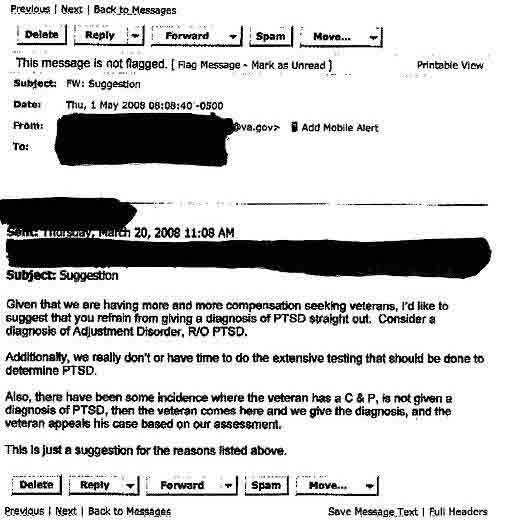As troops return from their second or even third tour of duty in Iraq with nightmares, flashbacks, and unrelenting anxiety. These are all symptoms of post-traumatic stress disorder (PTSD), but the number of PTSD diagnoses given by the Department of Veterans’ Affairs (VA) has not risen in step with the increase in trauma exposure. Many veterans have accused the VA of deliberately sidestepping PTSD diagnoses because they entitle the patient to thousands of dollars a month in disability compensation. Last week, this accusation gained support with the discovery of an incriminating email sent out by a program coordinator for the PTSD Clinical Care Team at the Temple, Texas Medical Center.
Coordinator Norma Perez gave the controversial email an innocuous title, “Suggestion”, but like most communications between managers and employees, it carries a power that blurs the line between suggestion and order. The line that is generating the most outrage reads, “I'd like to suggest that you refrain from giving a diagnosis of PTSD straight out.” Many are questioning why Perez would think it medically necessary to give this suggestion to healthcare professionals who have extensive tests and guidelines available to make reliable determinations.
Perez’s motivation may be divined by observing the focus of the rest of the email. Eight of the nine lines revolve around monetary concerns. For example, the line mentioned above begins with the preface “Given that we are having more and more compensation seeking veterans”. Further on, Perez offers a lame justification for avoiding PTSD: “We really don’t have time to do the extensive testing.”
The alternative offered by Perez is a stopgap diagnosis of adjustment disorder. This disorder is very similar to PTSD, except that it lasts no longer than six months. Unfortunately, or perhaps conveniently, very few veterans come back six months later for reevaluation. There is one additional difference that cannot be found in the diagnostic manual: adjustment disorder does not qualify veterans for costly (for the government) disability payments.
It is a grave injustice to skimp on a few hours of testing for people who have given years in service to their country. If the resources are not available, then soldiers at least deserve to know that they are not receiving adequate care. Giving out slapdash diagnoses may prevent veterans from receiving proper treatment for decades. When such mistakes are eventually uncovered, they undermine trust in the VA and imperil future recruitment efforts.
The VA officially repudiated the message of the email, calling it "inappropriate", but it did not back up those words by removing Perez. Fortunately, multiple senators have refused to let the issue drop there and have demanded a thorough investigation.

